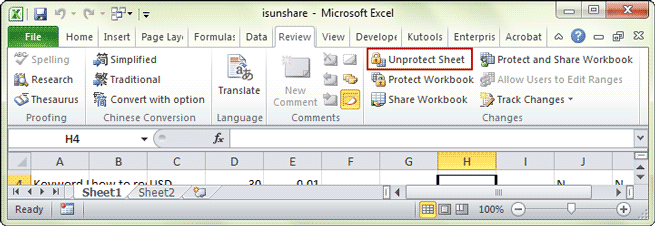Unlock Excel Secrets: Copy from Protected Sheets Easily

Unlock Excel Secrets: Copy from Protected Sheets Easily
Understanding Excel Sheet Protection

Excel, a powerful tool for data manipulation, allows for one key feature: the ability to protect your worksheets to prevent any unauthorized changes. This protection often extends to cell content, formulas, and even certain structural components of your workbook. But what if you find yourself needing to copy data from these locked sheets? It can seem like an insurmountable task, but there are several techniques that can help you unlock these secrets and handle protected sheets with ease.
Why Sheets are Protected

- Data Integrity: To prevent accidental changes or deletions that could compromise data accuracy.
- Security: To shield sensitive information from unauthorized viewers or modifiers.
- Collaboration: To control who can make changes to specific parts of the document, thereby ensuring the integrity of collaborative work.
Understanding these motivations is key when looking to work with protected sheets.
Methods to Copy from Protected Sheets

1. Using Built-in Excel Features

If you know the password, copying from a protected sheet is straightforward:
- Select the 'Review' tab in the ribbon.
- Click on 'Unprotect Sheet'.
- Enter the password when prompted.
- Copy the data as you normally would.
- Re-protect the sheet when you are finished.
🔐 Note: If you do not have access to the password, proceed with caution as circumventing security measures might breach privacy and integrity policies.
2. VBA Macros for Bypassing Protection

For situations where you can’t or don't want to enter the password:
- Open the Visual Basic for Applications (VBA) by pressing
Alt + F11. - In the Project Explorer, right-click on your workbook and choose 'Insert' then 'Module'.
- Paste the following code:
Sub CopyFromProtectedSheet()
Dim WS As Worksheet
Set WS = ThisWorkbook.Sheets("Sheet1") 'Change to your protected sheet's name
WS.Unprotect Password:="YourPasswordHere"
'Copy desired range, e.g.,
WS.Range("A1:B10").Copy Destination:=ThisWorkbook.Sheets("Sheet2").Range("A1")
WS.Protect Password:="YourPasswordHere", DrawingObjects:=True, Contents:=True, Scenarios:=True
End Sub
- Replace 'Sheet1' and 'Sheet2' with your source and destination sheet names respectively. Adjust the range if needed.
- Run the macro by pressing
F5or selecting 'Run' from the toolbar.
🔍 Note: The password in the code must match the one used to protect the sheet. If unknown, this method may not work.
3. Using External Tools

There are third-party tools and plugins available for Excel that can:
- Automatically unprotect sheets without the need for a password.
- Copy data from protected sheets to unprotected ones.
- Provide additional functionalities for working with Excel protection.
These tools are valuable for advanced users but come with a caution:
⚠️ Note: Using external tools to circumvent security can be a violation of data protection policies. Use with discretion and within the scope of your rights.
4. Manual Workarounds

If the sheet is not overly protected, you might use:
- The 'Right-Click' method, where you can select cells to copy even if the sheet is locked.
- The 'Filter' method, which might allow you to access data indirectly by using filters to isolate data for copying.
5. Collaboration and Requesting Access

Lastly, consider:
- Communicating with the person who protected the sheet to request temporary access or a duplicate file.
- Working collaboratively within the bounds of the protection settings to achieve your objectives.
📞 Note: Maintaining an open line of communication can simplify your workflow, prevent data integrity issues, and foster team synergy.
As we conclude, remember that while it's possible to bypass protection on an Excel sheet, ethical considerations should guide your actions. The methods outlined provide options for users to access protected data legally and safely within their rights. Always respect data security and seek consent when dealing with others' confidential information. Embrace collaboration where possible to ensure a productive environment for all.
What happens if I forget the password to a protected sheet?

+
If you forget the password, recovering it directly is not possible. However, you can explore recovery tools or seek help from specialized services.
Is it legal to use software to unprotect Excel sheets?

+
The legality depends on your right to the data and whether you are breaching any confidentiality agreements or security policies.
How can I prevent unauthorized access to my Excel sheets?

+
Use strong passwords, enable encryption, and consider sharing files securely, like through OneDrive with access permissions set.



